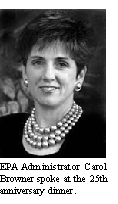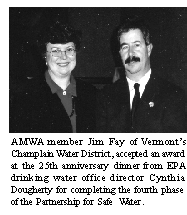
Water Community Celebrates 25th Anniversary Twenty-five years after the Safe Drinking Water Act was enacted, drinking water suppliers, EPA officials, environmentalists, and consumer advocates gathered in the nation's capitol to celebrate two and a half decades of progress and to consider the course ahead.
This, he said, means the industry will undergo significant change in the years ahead. Characterizing them as "Superfrog Leaps," McMullen offered three possible scenarios. First, there will likely be more emphasis put on source water protection over treatment. Second, consumers may see the Milkman Approach, in which ultra-pure water is sold alongside cartons of milk, while tap water is reserved for other uses. Finally, McMullen described the truly futuristic concept of delivering water to home treatment units, which are set to certain levels of purity based on the specific customer's needs. This, he said, puts the decision, and a higher level of responsibility, in the consumer's hands.
Politics And Privatization Are Themes For Feb. 2000 Legislative & Regulatory Conference Keeping up with industry and political change is the theme of the 2000 Legislative and Regulatory Conference, scheduled for February 28 to March 1 at the Watergate Hotel in Washington, D.C. In the nation's capitol, the new leadership of the Senate Environment and Public Works Committee is already reshaping next year's legislative agenda. EPA and the water community continue to hammer out regulatory policies for the future, while the drinking water industry continues to evolve as private firms position themselves to acquire assets, contracts, and concessions from publicly owned water systems. Leadership and Management. Building on an October 1999 workshop in Norfolk, leading consultants will discuss how better leadership and management skills can improve an organization's competitiveness. Policy Makers. Speakers invited from Capitol Hill include committee and subcommittee chairs, such as Sen. Robert C. Smith (R-N.H.), Sen. Michael Crapo (R-Idaho), Rep. Sherwood Boehlert (R-N.Y.), and Rep. James T. Walsh (R-N.Y.). EPA Assistant Administrator for Water Chuck Fox and the director of EPA's Office of Ground Water and Drinking Water, Cynthia Dougherty, are also invited. Making Waves. Members will also hear from their colleagues. The Boston Water & Sewer Commission's John Sullivan plans to talk about how the integration of information and technology can improve efficiency and competitiveness. John Huber, President of the Louisville Water Co., will discuss how the company operates as a both a municipal and investor-owned utility. Bill Brutsch, the Massachusetts Water Resources Authority (MWRA) water division director, will speak about MWRA's new effort to reach out to health care providers to better serve their customers. And a Metropolitan Water District of Southern California representative will discuss Met's recent demographic study, which is leading to significant changes in Met's long-term strategy. Vision 20/20. Following presentations on cutting edge treatment options such as ultraviolet disinfection and microfiltration, members will participate in roundtable discussions on technologies available to help water systems meet anticipated microbial and disinfection byproduct regulations. Jeff Mosher Joins AMWA National Office Staff Jeff Mosher was named AMWA's new Regulatory Affairs Manager recently. Mosher is a graduate of the College of William and Mary in Williamsburg, Va., and he holds a Masters of Science degree in environmental engineering from The George Washington University in Washington, D.C. Mosher had been a contractor to EPA's drinking water office. Regulatory Update EPA Charges Ahead On Rule Development At this time last year, the big news was the promulgation of the final Stage-1 Disinfectants and Disinfection Byproducts Rule and the Interim Enhanced Surface Water Treatment Rule. The Stage-2 rules became the big news for water systems during the past year with formal negotiations beginning in March. As next year unfolds, the Stage-2 rules will continue to be on the front burner since EPA is looking for a signed agreement from the negotiators in June 2000. The Filter Backwash Rule, which carries an August 2000 deadline for finalization, will also draw the attention of surface water systems in the new year with a proposed rule expected before spring. Meanwhile, many ground water systems received their big news in 1999 in the form of the proposed Radon Rule. EPA proposed a Maximum Contaminant Level (MCL) for radon of 300 picoCuries per liter (pCi/L) and an alternative MCL (AMCL) of 4,000 pCi/L for systems under a Multimedia Mitigation Program. The coming year will also bring ground water systems the proposed Ground Water Rule and the proposed Arsenic Rule, both expected before next summer. While the ground water proposal is not expected to significantly impact large systems presently disinfecting, the arsenic proposal may, particularly if EPA proposes an MCL of 5 parts per billion (ppb). The Unregulated Contaminant Monitoring Rule affecting all systems was promulgated at the end of last summer. Waiting in the wings for the new year are a number of other regulations affecting all systems. Revisions to the Lead and Copper Rule were signed in late December and will appear in the Federal Register in January. The final Public Notification Rule could slip under the wire and appear in 1999. A final Radionuclides Rule due in August 2000.
Privatization Notes
Chattanooga-Tennessee American Make Peace; May Have Spawned Legislation After a year-long battle by Chattanooga, Tenn. to take over the Tennessee-American Water Company (TAWC) subsidiary that provides Chattanooga with its water, the city agreed to stop its action in exchange for more cooperation from TAWC and a $1 million reduction in annual hydrant fees. This city was trying to accomplish the takeover by exercising eminent domain powers through condemnation. Meanwhile, in Washington, D.C., the controversy may have produced a bill outlawing the use of tax-except financing to take over water utilities through eminent domain. Rep. Phil Crane (R-Ill.) introduced H.R. 3309 in November "to deter unwarranted hostile takeovers of water utilities." The bill would allow such actions only if approved by voters or if the takeover target is in continued violation of water regulations. KY Water District Bids To Acquire Ohio System In a move rarely seen in the public utility industry, Northern Kentucky Water Service District bid earlier this year to purchase Newport, Ohio's water works. Newport is a suburb of Cincinnati. With the support of Newport officials, Northern Kentucky offered to assume $9 million in debt, give the city an additional $7 million, and retain all current employees. City officials favored the sale to avoid a potential 30-40 percent rate hike needed for infrastructure improvements, but Newport voters narrowly rejected the bid. WSSC Privatization Task Force Finalizes Report The task force studying privatization options for the Washington Suburban Sanitary Commission (WSSC), a water and wastewater utility serving 1.6 million people in Maryland's suburbs north of Washington, D.C., issued its final report November 30. The task force, established by the Maryland House and Senate, made two recommendations after a year-long study. First, says the report, the state legislature should establish a committee charged with further evaluating WSSC's governance, long-term options, and the potential of reassigning some WSSC functions to Montgomery and Prince George's Counties, the two joint owners of WSSC. Long-term options, identified by Malcolm Pirnie, Inc., include an asset sale, contract operations, bifurcation and management by the individual counties, and restructuring via competitiveness enhancement and increase efficiency. The task force's second recommendation is that the utility continue its program to increase efficiencies and become more competitive, followed by establishing longer-term goals and objectives. Thames Water (UK) Hires Former U.S. Senator Fresh from the Northern Ireland peace talks, former U.S. Senator George Mitchell (D-Maine) joined Thames Water PLC in late November. Mitchell will be the company's U.S. acquisition advisor. It is anticipated that Mitchell will help Thames through the difficult maneuvers it will need to purchase E'Town Corp., which serves 1 million people in New Jersey. UK Water Regulator Forces 14 Percent Rate Cuts Kelda Group, Severn Trent, and Anglian Water announced major job cuts in early December in response to a UK government-mandated 14 percent rate cut. Kelda Group, which is positioning for a U.S. market by acquiring Aquarion (formerly Bridgeport Hydraulics) plans to ax 500 of the company's 2,700 jobs. Severn Trent, another large UK water supplier, plans to cut 1,100 of its 5,800 employees. Anglian Water's CEO intends to cut 400 posts. Azurix's UK subsidiary, Wessex Water, has not announced job cuts. Legislative Update Congressional Schedule. Congress will return on January 24 to begin the Second Session of the 106th Congress. Following President Clinton's final State of the Union Address and after GOP and Democratic Party retreats, the Senate recesses again February 12-21, and the House is gone February 19-27. EPA Appropriations. EPA Administrator Carol Browner will present the Agency's fiscal year 2001 budget in early January. On October 20, the President signed the fiscal year 2000 appropriations bill. It includes a total of nearly $43 million in drinking water research and $820 million for loans. Superfund. Two Superfund bills continue to vie for attention. The new chair of the Senate Environment and Public Works Committee has put Superfund reform near the top of his priority list. AMWA is seeking to maintain ground water clean up standards and prevent water suppliers from being liable for accidentally causing contaminated plumes to spread and for the spread of contaminants along utility trenches at Superfund redevelopment projects known as brownfields. Plumbing Standards. The battle over H.R. 623 continues in the House. Water suppliers have generally opposed the bill because it repeals bathroom fixture water conservation standards that are current law. The U.S. General Accounting Office is conducting a study of how the fixtures can affect long-term infrastructure costs for water and wastewater systems. Regulatory Reform. House and Senate Committees have passed separate bills to reform how federal agencies develop regulations. S. 1214 would direct the U.S. General Accounting Office to review significant regulations and report to Congress. H.R. 1074 would direct the White House Office of Management and Budget to report annually to Congress on the costs and benefits of regulatory programs. S. 746 would require cost-benefit analyses and risk assessments on rules costing the economy over $100 million. S. 746 would also expose rule development to more extensive judicial review, providing more opportunities to have a court overturn a rule. Suits Against Water Suppliers. This spring, amidst suits by consumers against a number California community water suppliers, Rep. Gary Miller (R- Calif.) introduced H.R. 1674 to block claims where water suppliers meet national drinking water regulations. According to the bill, In a civil action . . . relief may not be provided. . . if . . . the level of the contaminant in such water is at or below the applicable maximum contaminant level . . . or . . . the public water system is using treatment techniques in accordance with such regulations. Consumer Confidence Reports. Sen. Frank Lautenberg (D-N.J.) is the author of S. 1149, which would require that water systems distribute their CCRs to "consumers" and not just "customers." Also, CCRs would include health effects of detected contaminants and drinking water contaminant sources identified by name and location. In addition, water systems would be required to provide written notice to consumers of the discovery of new contamination and significant increases in contaminant levels. Bottled Water CCRs and Regulations. Lautenberg also wrote S. 790, which would direct FDA to publish a consumer confidence report for consumers of bottled water. The report would detail nearly the same information individual water suppliers provide their customers. S. 790 also directs the FDA to conform its bottled water regulations with regulations for drinking water issued by EPA, the World Health Organization, the European Union, and the State of California. Where FDA's rules are weaker or nonexistent, the FDA must conform to the other agencies' rules. If FDA fails to comply, its regulatory powers over bottled water would shift to EPA. A companion bill &endash; H.R. 2108 &endash; was introduced in the House. Radium 224. In response to the cluster of cancer cases found in children in Toms River, New Jersey, Rep. Jim Saxton (R-N.J.) introduced a bill this summer that directs EPA to study and regulate Radium 224. According to Saxton, Radium 224 in drinking water was a factor in the cancer cases. |

 Speaking on December 16 at the Futures Forum, L.D.
McMullen, Ph.D., General Manager and CEO of the Des Moines Water Works,
described the customer of the future and the major changes in store for
drinking water suppliers. McMullen is a Board Member and former President
of AMWA, and he chairs EPA's National Drinking Water Advisory Council. In
the future, McMullen said, the drinking water industry will be affected by
a handful of key drivers. One of which is the relatively recent
"cross-pollination" between analytical chemistry and epidemiology,
enhancing our ability to identify contaminants and link them to health
effects. Moreover, as our population grows older and lives longer amidst a
variety of health problems, the concept of small sets of sensitive
subpopulations is giving way to the reality that all consumers at one time
or another are going to be a member of a vulnerable subpopulation.
However, studies show that most physicians don't know any more about the
water they drink than the average consumer.
Speaking on December 16 at the Futures Forum, L.D.
McMullen, Ph.D., General Manager and CEO of the Des Moines Water Works,
described the customer of the future and the major changes in store for
drinking water suppliers. McMullen is a Board Member and former President
of AMWA, and he chairs EPA's National Drinking Water Advisory Council. In
the future, McMullen said, the drinking water industry will be affected by
a handful of key drivers. One of which is the relatively recent
"cross-pollination" between analytical chemistry and epidemiology,
enhancing our ability to identify contaminants and link them to health
effects. Moreover, as our population grows older and lives longer amidst a
variety of health problems, the concept of small sets of sensitive
subpopulations is giving way to the reality that all consumers at one time
or another are going to be a member of a vulnerable subpopulation.
However, studies show that most physicians don't know any more about the
water they drink than the average consumer. Consumer trends
comprise another industry driver, McMullen continued. For instance,
consumers have become accustomed to basing their actions on capsulated
bits of information, such as news briefs found on the Internet. This
trend, combined with readily available information on health, leads
consumers to making their own decisions about their health. This, he said,
explains the explosive growth in home filter and bottled water sales.
Meanwhile, as science becomes more adept at identifying new contaminants,
leading to more and more regulations, the cost of safe drinking water
rises. So, McMullen continued, if a consumer has already spent her
hard-earned dollar on bottled water - water she perceives as safer than
tap water, will she be inclined to pay more for tap water she doesn't
drink?
Consumer trends
comprise another industry driver, McMullen continued. For instance,
consumers have become accustomed to basing their actions on capsulated
bits of information, such as news briefs found on the Internet. This
trend, combined with readily available information on health, leads
consumers to making their own decisions about their health. This, he said,
explains the explosive growth in home filter and bottled water sales.
Meanwhile, as science becomes more adept at identifying new contaminants,
leading to more and more regulations, the cost of safe drinking water
rises. So, McMullen continued, if a consumer has already spent her
hard-earned dollar on bottled water - water she perceives as safer than
tap water, will she be inclined to pay more for tap water she doesn't
drink? In
conclusion, McMullen told the audience that the water supplier most
consumers know will be replaced by a supplier who is part environmentalist
(protecting source water); part physician (explaining the health effects
of contaminants); part teacher; and part high-tech business manager.
In
conclusion, McMullen told the audience that the water supplier most
consumers know will be replaced by a supplier who is part environmentalist
(protecting source water); part physician (explaining the health effects
of contaminants); part teacher; and part high-tech business manager.